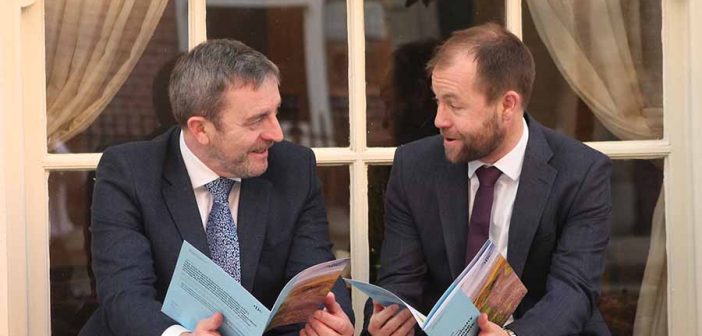- ITIC says tourism is now worth €8.1bn annually
- “Government tourism targets unambitious and modest”.
- Ireland attracted record 8.8m in 2016
- Spend by international visitors increased by 9pc in 2016
- Employs 230,000 nationally
- 1 in 9 jobs nationally in tourism & hospitality sector
- Average spend per US visitor while in Ireland: €790

The Irish Tourism Industry Confederation called on the government to travel its investment in tourism product, when the capital budget allocations are decided by the government in the spring.
The call came as ITIC published their plan for tourism to 2025. ITIC said the industry is now worth €8.1bn for the first time and overseas tourists spent €4.7bn in Ireland in 2016. This represented a 9pc increase, or almost €600m more compared to what was spent the previous year. Irish air and sea carriers earned a further €1.5bn from tourists.
ITIC argued that overseas earnings generated by Irish tourism can be worth €7bn annually by 2025, a 50pc increase on the current export value. ITIC is confident that the sector can deliver on this if the right policies and investment strategies are pursued.
ITIC says tourism is now worth €8.1bn annually. Takeaways from the annual results are that Ireland attracted 8.8m international staying visitors in 2016 – a new record, spend by international visitors increased by 9pc in 2016, the industry now employs 230,000 nationally, 1 in 9 jobs nationally in tourism & hospitality sector, the average spend per US visitor while in Ireland: €790 and every €1m of tourist expenditure supports 34 tourism jobs, for every €1 spent by tourists 24.5c is generated in tax.
Domestic tourism demand also picked up generating an estimated €1.75bn, with a further €300m earned from visitors from Northern Ireland.
According to the CSO, the number of overseas visitors grew by 10pc to 8.8m – the highest number on record – with all four top source markets recording significant growth. There was an increase of 10pc in holiday visitors, while business visitors and those coming to visit friends and relatives (VFR) were up 12pc.
Paul Gallagher, ITIC chairman, said “It has been a remarkable year for Irish tourism with record visitor numbers in both volume and value terms. 20,000 new jobs have been created in the sector in the last year and tourism is now Ireland’s largest indigenous employe. The current national government tourism targets to 2025 are unambitious and modest. It is high time that a new strategy is put in place for tourism growth that is led by the industry and facilitated by pro-tourism policies from the government. Tourism is in a strong place at the moment and now is the time for the Irish tourism industry to be planning ambitiously for the future. As a sector we can add 50,000 more jobs by 2025 if the right strategy is pursued. Irish tourism businesses are positive about 2017 and are investing heavily in marketing as well as focusing on the need to continue delivering good value for money. The Government decision to maintain the 9pc VAT rate on tourism services continues to support Ireland’s competiveness on the back of operating efficiencies and better value offerings from tourism businesses. The domestic market, which underpins many tourism enterprises, is expected to see further pick-up in the demand for short leisure breaks as personal finances improve.
Despite Brexit concerns and capacity constraints, ITIC believes that the tourism industry can grow by a further 5pc in overseas visitors and 7pc in export revenue for 2017, given the healthy state of key source market economies and the increased air access into Ireland. However, growth is not guaranteed and there is much work to be done to underpin and sustain progress to date.
Tourism has much more potential for Ireland, but only if the right strategies and investment policies are pursued. ITIC believes that, based on anticipated tourism revenue growth, at least a further 7,000 jobs can be created in the tourism industry in 2017. It is one of the few industries that provides regional balance and delivers jobs in all parts of the country. Britain decision to exit the EU is a major challenge for Irish tourism. Although its impact has been modest to date, the immediate-term challenge has been the weakening of sterling. “As sterling weakens due to the uncertainty over Brexit, it is more vital than ever that Ireland remains competitive. I welcome the Government’s retention of the tourism Vat rate at 9pc as this puts Ireland on an even keel with our European neighbours. In fact, 17 of the 19 euro-zone countries have Vat rates of 10pc or less. The Irish tourism industry too needs to remain competitive and continue to offer value for money and a high quality tourism experience. Of significant concern is tourism’s place within any new Britain-EU deal. Mr O’Mara Walsh said: “A hard Brexit would be damaging to Irish tourism. It is vital that in the negotiations between Britain and the EU that Irish tourism’s needs are reflected. This particularly relates to the need to maintain the Common Travel Area and the retention of liberalised air access rights.”
Such has been the growth in tourism in recent times that demand has outstripped supply. This is particularly evident in terms of a shortage of hotel capacity in Dublin and other urban centres which risks limiting the ability of Ireland to attract increasing volumes of visitors. Dublin hotels are operating for much of the year at close to full occupancy due to the city’s popularity as a leisure and business destination. ITIC has long advocated that additional capacity is required in the capital city, Ireland’s dominant gateway.
Dublin has significant capacity constraints and visitor number targets will not be met unless the deficit in hotel bedroom development is addressed with some urgency.”
We welcome the fact that up to 5,000 bedrooms are planned for Dublin in the coming years, but construction and development of these new hotels needs to start now. If demand and supply is out of sync, there will always be upward pressure on prices and a loss of competitiveness represents the single largest threat to tourism’s future growth. Should the planned new hotels not materialise, there will need to be policy intervention to stimulate new builds”.
ITIC has argued for some time that there is inadequate investment by the state in tourism. If tourism is to continue to grow, increase jobs, and provide an economic stimulus nationwide there needs to be increased marketing and product investment.
Eoghan O’Mara Walsh expressed disappointment with the level of marketing investment in the recent budget: “The Government committed to a restoration of marketing funds and there has been no progress in this regard. Ireland is losing its share of voice internationally and this will detrimentally affect Irish tourism in the near future unless the marketing deficit is addressed with urgency”.
ITIC is calling for a significant increase in tourism infrastructure spending in the upcoming review of the National Capital Plan. The Government needs to increase capital spending on tourism projects to €350m over the next five years. This is a small fraction of what tourism contributes to the national economy and the investment is badly needed to ensure that there are new things to see and do of scale and international appeal.”
Eoghan O’Mara Walsh ITIC Chief Executive said: “Irish tourism has performed extremely well in 2016, which is testament to the quality and competitiveness of our tourism product and industry. A number of external factors have also been in Ireland’s favour, including increased air access and a weak euro. It is vital that we chart a path for sustainable growth and avoid a return to the peaks and troughs of previous times”.
- Listen here to Travel Extra’s Eoghan Corry speaking about the report on the RTE News at One..
- The plan for tourism 2025 full document: Tourism 2025 ITIC plan.
- Watch here the call for increased investment
- Paul Gallagher said Irish government capital spending on tourism is just spare change (watch here).
- Gallagher and ITIC CEO Eoghan O’Mara Walsh looked back on 2016 (watch here).
- Eoghan O’Mara Walsh looked forward to 2017 (watch here)
- Eoghan O’Mara Walsh predicted 3pc growth in 2017 for inbound Irish tourism (watch here).
- Paul Gallagher predicts Irish tourism will create 50,000 extra jobs by 2025 (watch here)
- Paul Gallagher said the 9pc VAT rate is as important to tourism as the 12.5pc corporate tax rate is to FDI (watch here).
- Eoghan O’Mara Walsh pointed out the importance of investment as that most tourism assets in Ireland are state owned (watch here).
- Paul Gallagher also spoke about Dublin’s hotel bed shortage as a hand-brake on tourism growth for the country as a whole (watch here).
- Paul Gallagher said there was no need for a multiplicity of tourism brands although the existing three were successful (watch here). Paul Gallagher said the Tourism ministry had a reputation as ministry of fun and the industry had become more professional in recent years (watch here).
- Paul Gallagher and Eoghan O’Mara Walsh also spoke at length of the Implications of Britain’s EU exit (watch here).
- Q&A session reference to Airbnb (watch here),
- Q&A session reference to value for money in Irish tourism (watch here),




